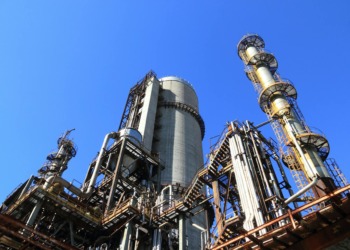Removing carbon from the atmosphere is crucial in battling the climate crisis — CO2 accounts for nearly 76% of all greenhouse gas emissions, says the Center for Climate and Energy Solutions.
Moreover, the Intergovernmental Panel on Climate Change’s (IPCC) latest assessment, released in 2022, outlines with high confidence that “[global] warming cannot be limited to 2°C or 1.5°C without rapid and deep reductions in energy system CO2 and GHG emissions.”
San Francisco-based start-up Living Carbon, co-founded by CEO Maddie Hall, is creating trees with a photosynthesis enhancement trait that aids with growth and allows for a greater absorption of carbon dioxide (CO2).
A research paper published by the Living Carbon team documents the results of the start-up’s controlled experiment, in which genes that drive natural processes in plants are integrated into the DNA of new plants. The experiment lasted four months, and boasted an increased growth rate of 53% and carbon removal rate of 17-27%.
The start-up produces climate-smart seedlings that grow faster than ordinary trees and are able to capture more carbon on less land. The seedlings are also equipped with a metal accumulation trait — this means that their roots can absorb more metals. These metals then slow wood decay, which allows carbon to remain stored in the roots and stems of trees for longer.
The seedlings bypass photorespiration — a wasteful side process of photosynthesis that slows growth and releases already-fixed carbon back into the atmosphere as CO2. The trees are able to recycle the byproduct of photosynthesis more quickly and using less energy than normal trees, which allows for a greater capture of CO2.
Part of the start-up’s work is their carbon project, which involves paying landowners to use their property for carbon removal, particularly on abandoned land mines, degraded agricultural lands including pasture, and other unproductive soils.
The start-up says that the project has seen roughly 170,000 seedlings planted across 120 hectares of land, 5% of which had been genetically modified.
CEO Maddie Hall Strikes a Balance Between Science And Start-Up
“The mission of Living Carbon is to utilise the advanced biotechnology that has allowed humans to develop in isolation from our ecosystem. Really, ever since we domesticated fire, humans have been able to grow our population, but [we] do so in isolation from our ecosystem. And, as a result, we’ve actually degraded 75% of our land. And in addition to that, we’ve utilised most of our energy that’s stored in our natural world. The mission of Living Carbon is to utilise human technology to start to see ourselves as part of our ecosystem.”
CEO and co-founder of Living Carbon Maddie Hall says she took the “biggest risk of [her] life” when she started the company in 2019, but she felt compelled to aid in the solving of our most existential challenge: the climate crisis.
To battle climate change, Hall says, we need both frontier research and commercial-scale deployment of carbon removal. This is difficult, though, because academic timelines tend not to be “the same as those needed for rapid carbon drawdown.”
Related Articles: Coca-Cola Plans to Make Bottle Tops From CO2 | Potential Benefits of Genetically Modified Food | DNA Data Offers Benefits Many of Us Will Never Realise
This means that Living Carbon can’t only master the science — the company also has to market a product that will sell.
Maddie Hall describes Living Carbon as a Tesla for trees, Forbes global media company writes. “Cars geared toward environmentalists were ugly and didn’t survive,” Hall says, “but Tesla was cool — and people bought it because of that.”
A Race Against Global Boiling
As Hall states, “you really need large-scale adoption of anything to make a difference in carbon removal.” Her blog on the Living Carbon website outlines:
“Working on traditional timelines and taking each step one at a time – for 10 or 15 years – would leave us facing a very different world by the time we were ready to start planting. Planting at a larger scale allows us to learn from large amounts of real-world data and improve our trait and forest management.”
In other words, large-scale adoption is highly advantageous for both the environment and the building of data for Living Carbon to work with. However, implementing a wider adoption of the start-up’s seedlings hasn’t come without criticism.
Friends of the Earth Europe, for instance, strongly advises against genome editing — a fundamental pillar of Living Carbon’s project — in a 2021 report, stating that it comes with “too many uncertainties.”
Other campaign groups have also been reported to state that “there is no proof that it will work at scale, and it could take decades to develop.”
That is not to say that the project is without backing. Living Carbon reported to have received $36m in venture capital funding since its founding in 2019, and its website writes that the start-up is backed by big investors in climate tech, including Temasek, Lowercarbon Capital, Toyota Ventures, Felicis Ventures, Day One Ventures, Goat Capital, among others. Hall has also raised millions from Y Combinator, Sam Altman and Alexis Ohanian.
One major issue with battling climate change is that a huge amount of “damage is already done.” Entirely reversing the effects of global warming is near-impossible. So, despite the criticism, Living Carbon may represent a real-time saving grace for the planet.
Editor’s Note: The opinions expressed here by the authors are their own, not those of Impakter.com — In the Featured Photo: Plant seedlings. Featured Photo Credit: Francesco Gallarotti.










